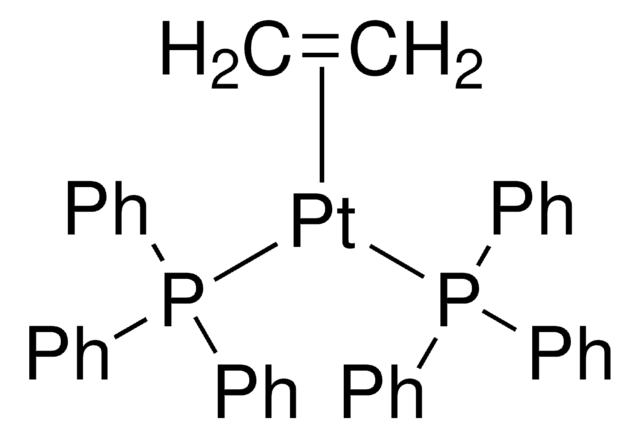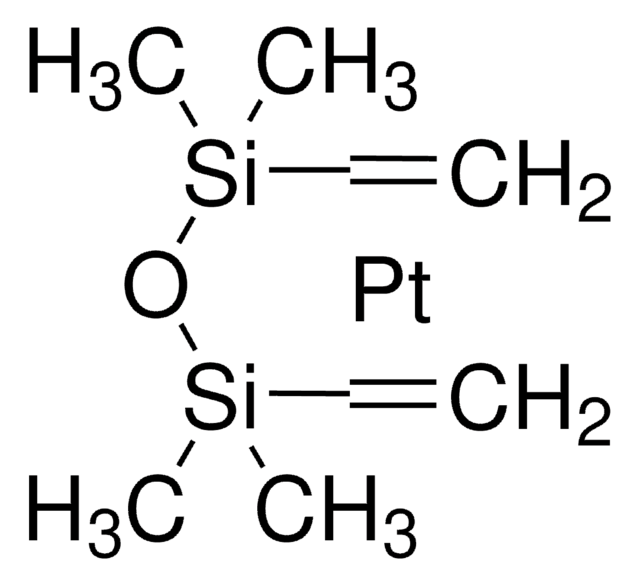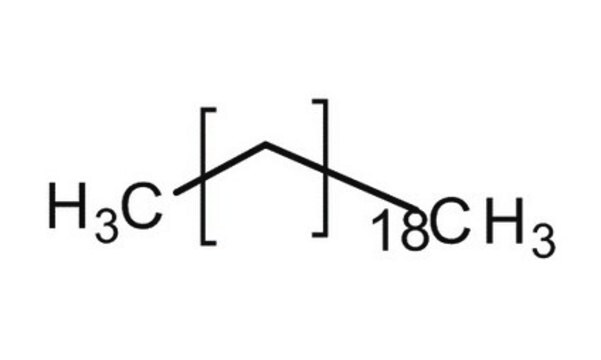286052
Heneicosane
98%
Sinonimo/i:
n-Heneicosane
Autenticatiper visualizzare i prezzi riservati alla tua organizzazione & contrattuali
About This Item
Formula condensata:
CH3(CH2)19CH3
Numero CAS:
Peso molecolare:
296.57
Beilstein:
1748500
Numero MDL:
Codice UNSPSC:
12352100
ID PubChem:
NACRES:
NA.22
Prodotti consigliati
Densità del vapore
10.3 (vs air)
Livello qualitativo
Tensione di vapore
<1 mmHg ( 20 °C)
Saggio
98%
Stato
solid
P. ebollizione
100 °C/2 mmHg (lit.)
356.1 °C/760 mmHg
Punto di fusione
39-41 °C (lit.)
Stringa SMILE
CCCCCCCCCCCCCCCCCCCCC
InChI
1S/C21H44/c1-3-5-7-9-11-13-15-17-19-21-20-18-16-14-12-10-8-6-4-2/h3-21H2,1-2H3
FNAZRRHPUDJQCJ-UHFFFAOYSA-N
Cerchi prodotti simili? Visita Guida al confronto tra prodotti
Categorie correlate
Descrizione generale
Heneicosane is one of the important components of Carthamus tinctorius flowers essential oil, essential oil from Tragopogon graminifolius DC and essential oils from the bud of Citrus aurantium L. var. amara Engl.
Codice della classe di stoccaggio
11 - Combustible Solids
Classe di pericolosità dell'acqua (WGK)
WGK 3
Punto d’infiammabilità (°F)
235.4 °F - closed cup
Punto d’infiammabilità (°C)
113 °C - closed cup
Dispositivi di protezione individuale
Eyeshields, Gloves, type N95 (US)
Scegli una delle versioni più recenti:
Possiedi già questo prodotto?
I documenti relativi ai prodotti acquistati recentemente sono disponibili nell’Archivio dei documenti.
I clienti hanno visto anche
Jinous Asgarpanah et al.
Chinese journal of integrative medicine, 19(2), 153-159 (2013-02-02)
Carthamus tinctorius L. is commonly known as Safflower. C. tinctorius extracts and oil are important in drug development with numerous pharmacological activities in the world. This plant is cultivated mainly for its seed, which is used as edible oil. For
Ming-Hua Jiang et al.
Journal of food science, 76(9), C1219-C1225 (2012-03-16)
A comparative study of steam distillation extraction (SDE), reflux extraction (RE), and ultrasound-assisted extraction (USE) was conducted for the extraction of essential oils from the bud of Citrus aurantium L. var. amara Engl. Each method was evaluated in terms of
Mohammad Hosein Farzaei et al.
Natural product communications, 9(1), 121-124 (2014-03-26)
Tragopogon graminifolius DC., family Compositae, is widely consumed as a green vegetable in the west of Iran and for the treatment of gastrointestinal and hepatic ailments. In this study, the chemical composition of the essential oil from T. graminifolius aerial
Luana Quassinti et al.
Fitoterapia, 97, 133-141 (2014-06-14)
Smyrnium olusatrum (Apiaceae), well known as wild celery, is a biennal celery-scented plant used for many centuries as a vegetable, then abandoned after the introduction of celery. In the present work, the essential oil obtained from inflorescences and the amounts
Christian Zorzetto et al.
Fitoterapia, 100, 95-109 (2014-12-03)
In the present work we carried out a phytochemical and biological investigation on three Hypericum species, i.e. Hypericum reflexum, Hypericum canariense and Hypericum grandifolium, from the Canary Islands where they are traditionally used as diuretic, wound healing, vermifuge, sedative and
Global Trade Item Number
| SKU | GTIN |
|---|---|
| 286052-10G | 4061826259702 |
| 286052-1G | 4061826259719 |
Il team dei nostri ricercatori vanta grande esperienza in tutte le aree della ricerca quali Life Science, scienza dei materiali, sintesi chimica, cromatografia, discipline analitiche, ecc..
Contatta l'Assistenza Tecnica.














